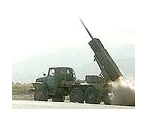|
|
TODAY.AZ / Politics
Russian arms said to have deterred Israel
22 August 2006 [00:15] - TODAY.AZ

Israel lost dozens of tanks, several helicopters and 116 men during its month-long push into southern Lebanon, the heaviest losses it suffered in any of the previous wars against Arabs. This gave Hizbollah leader Hassan Nasrallah reason to claim that his men had achieved "a strategic, historic victory" over "a confused, cowardly and defeated" enemy.
Israeli officials blamed the losses on Russian anti-tank grenades and missiles that had been allegedly supplied to Hizbollah by Syria and Iran.
Last week, Tel Aviv dispatched a senior Foreign Ministry official to Moscow to discuss the issue. Russia has denied supplying any weapons to Hizbollah, dismissing the Israeli allegations as "insinuations." However, Israel believes Hizbollah could have received the Russian weapons from Syria and Iran.
Media reports said the Israelis captured a batch of an Iran-made copy of the Russian Konkurs anti-tank missile (AT-5 Spandrel in NATO classification).
Russian experts expressed bewilderment that this wire-guided weapon developed in the Soviet Union more than 30 years ago could be effective against Israel's sophisticated Merkava Mark IV main battle tank, whose add-on and built-in explosive reactive armour makes it one of the best protected tanks in the world.
Israeli army commanders said they also captured some Russian-made Kornet-E and Metis-M anti-tank guided missiles. These are 10-year-old weapons capable of piercing one-metre-thick armour. Russia has supplied both systems to Syria, but they could have also found their way to West Asia from other former Soviet republics. Ukraine in particular was accused of illegally selling 500 Kornet systems to Iraq before the U.S.-led war against that country.
Israeli security sources also claimed the Hizbollah fighters widely used Russian-built RPG-29 "Vampire" grenade launchers, a formidable shoulder-fired anti-tank weapon whose warhead could get through the massive armour of the Israeli tanks at a range of up to 4 km. Hundreds of RPG-29 grenades were sold to Syria in 1998. However, the Russian Foreign Ministry said all weapons supplied to Syria had an end-user certificate that banned their re-export to a third country, and therefore, they could not have ended up in Lebanon.
Whatever the source of Russian-designed or Russian-built weapons in Lebanon, they enabled Hizbollah to effectively employ guerilla warfare tactics to slow and oppose Israel's advance into Lebanon.
Privately, Russian arms manufacturers expressed the hope that the controversy about Russian arms in Lebanon would whet foreign appetite for Russian-made military hardware, as it happened after the 2003 war in Iraq.
"We are grateful to the Israelis for the extra ad work they did for us," a source at a Russian defence factory said.
"This may help us finalise several contracts for the export of small arms."
After the war in Iraq, where 30-year-old Russian air defence systems and anti-tank missiles showed their mettle against state-of-the-art U.S. aircraft and armour, Russia doubled its arms exports.
/www.india-defence.com/
URL: http://www.today.az/news/politics/29225.html
 Print version
Print version
Connect with us. Get latest news and updates.
See Also
- 12 February 2026 [14:14]
Baku and Washington have passed a verdict on the 907th Amendment - 12 February 2026 [11:11]
Rhymes won't help! - 11 February 2026 [14:14]
United States takes over nuclear security of South Caucasus - 11 February 2026 [13:32]
President Ilham Aliyev chairs meeting on Azerbaijan's new digital architecture action plan - 11 February 2026 [12:43]
President Ilham Aliyev receives delegation headed by President of Arab Parliament - 11 February 2026 [12:41]
CBA, U.S. Chamber of Commerce discuss expanding financial and investment cooperation - 11 February 2026 [11:25]
President Ilham Aliyev sends congratulatory letter to President of Iran - 11 February 2026 [11:09]
Footage of President Ilham Aliyev's meeting with U.S. Vice President JD Vance posted on his social media - 11 February 2026 [10:43]
U.S. Vice President JD Vance pays tribute to Azerbaijani martyrs in Baku - 10 February 2026 [14:32]
President Ilham Aliyev appoints new chairman of State Statistical Committee - decree
Most Popular
 United States takes over nuclear security of South Caucasus
United States takes over nuclear security of South Caucasus
 Baku and Washington have passed a verdict on the 907th Amendment
Baku and Washington have passed a verdict on the 907th Amendment
 Israel's Herzog hopes US talks can topple Iran's 'evil empire'
Israel's Herzog hopes US talks can topple Iran's 'evil empire'
 German expert: Vance's trip to South Caucasus means more than just working trip
German expert: Vance's trip to South Caucasus means more than just working trip
 Turkish Airlines to resume and expand flights between Istanbul and Yerevan
Turkish Airlines to resume and expand flights between Istanbul and Yerevan
 Zatulin’s speech exposes Kremlin’s anxiety over post-Karabakh order [OPINION]
Zatulin’s speech exposes Kremlin’s anxiety over post-Karabakh order [OPINION]
 UAE’s Mohamed Ali Al Shorafa meets Baku officials, strengthens Azerbaijan-UAE ties
UAE’s Mohamed Ali Al Shorafa meets Baku officials, strengthens Azerbaijan-UAE ties
